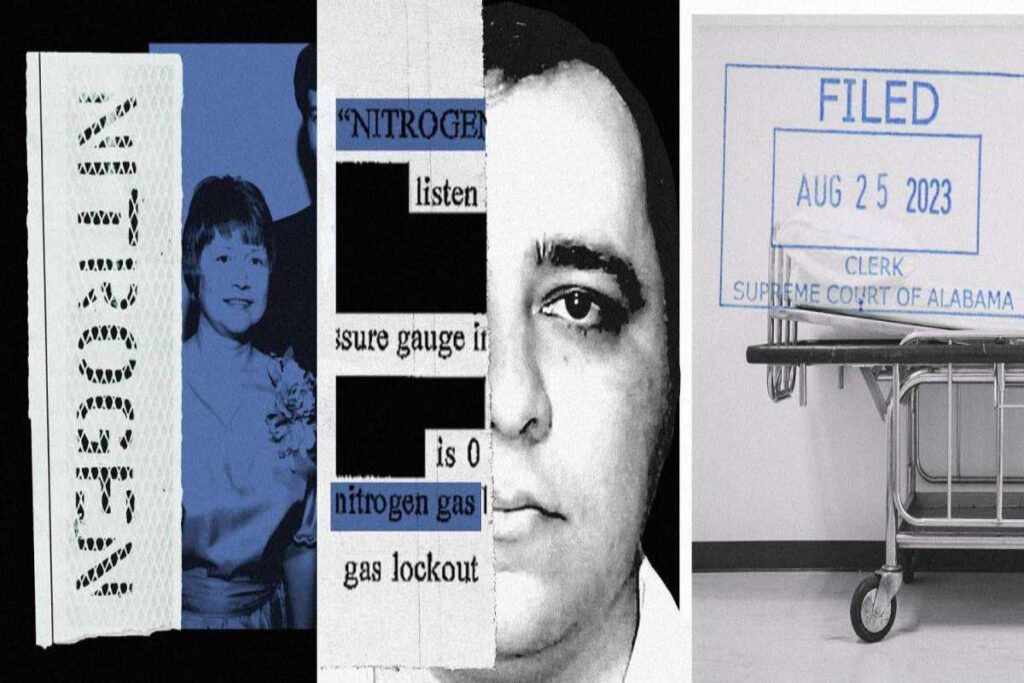
Alabama will put an inmate to death with nitrogen gas later this month. A federal judge gave the go-ahead on Wednesday, January 10, 2024, clearing the way for the nation’s first execution under a new method. However, the inmate’s lawyers criticize the procedure as cruel and experimental.
U.S. District Judge R. Austin Huffaker rejected Alabama inmate Kenneth Eugene Smith’s request for an injunction to stop his scheduled January 25 execution by nitrogen hypoxia. Consequently, Smith’s attorneys said the state is trying to make him the “test subject” for an untried execution method.
Also, they vowed to appeal the decision. According to reports, the state plans to put a respirator-type face mask over his nose and mouth. However, this mask will replace breathable air with nitrogen, causing him to die from lack of oxygen.
According to reports, three states, Alabama, Mississippi, and Oklahoma, have authorized nitrogen hypoxia as an execution method. However, states have yet to attempt to use it so far. Hence, the question of whether the execution by nitrogen gas can ultimately proceed remains unanswered.
ALSO READ: U.S. Army Corrects Records of Black Soldiers Wrongfully Hanged in 1917
However, critics argue it could end up before the U.S. Supreme Court. Smith, now 58, was one of two men convicted of the murder-for-hire slaying of a preacher’s wife in 1988. The tragic incident rocked the small North Alabama community.
Authorities found the murder victim, Elizabeth Sennett, dead on March 18, 1988, in the home she shared with her husband. The two lived in Alabama’s Colbert County. The coroner testified that the culprits stabbed the 45-year-old woman eight times in the chest. Also, they stabbed her once on each side of the neck.
POLL — Do You Support Stricter Gun Control Laws and Assault Weapon Bans?
Prosecutors said Sennet’s husband paid Smith and the other man $1,000 to kill her. According to reports, her husband was deeply in debt and wanted to collect on insurance. Her husband, Charles Sennett Sr., then pastor of the Westside Church of Christ, killed himself when the murder investigation began.
Smith, on the other hand, survived the state’s prior attempt to execute him after the trial. The Alabama Department of Corrections tried to give Smith a lethal injection in 2022. However, they called it off when authorities could not connect the two intravenous lines required to execute him.
The judge’s ruling letting the nitrogen execution plan go forward came after a court hearing in December 2023. During the hearing, attorneys for Smith and Alabama gave diverging descriptions of the risks of death from nitrogen gas.
ALSO READ: Former CIA Director Under Fire for Calling for Alabama Senator’s Assassination
The Alabama Attorney General’s office said the deprivation of oxygen will “cause unconsciousness within seconds and cause death within minutes.” The state compared the new execution method to industrial accidents in which people died from exposure to nitrogen gas.
However, attorneys for Smith argued that the new execution protocol has many unknowns and potential problems. Also, they argued that it could violate the constitutional ban on cruel and unusual punishment. In addition, Smith’s attorneys argued that the gas mask would interfere with Smith’s ability to pray aloud.
Also, they said it would stop him from making a final statement before witnesses in his last moments. However, the Alabama attorney general’s office argued that Smith’s concerns are speculative.
You Might Also Like:
Michigan Woman Wins $2 Million After Store Clerk Picked Out Scratch Off for Her
Officials Identify Headless, Blood-Drained Cold Case Victim After Nearly Thirteen Years
60-Year-Old Teacher Undergoes Brain Surgery After Student’s Attack
NYTimes Under Fire for Publishing Essay Speculating Taylor Swift’s Sexuality
Texas Governor Greg Abbott Condemns Biden for Suing Over Border Law
